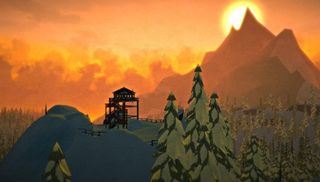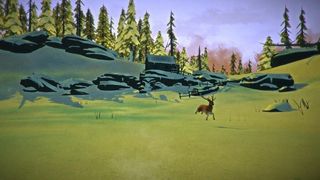
From the Aztecs worrying about the sun disappearing from the sky, to Hollywood's endless variations on the end of the world, it seems like every civilisation is fascinated with the idea that it might be the last. Perhaps it's a sign of humanity's general narcissism, with each generation secretly hoping to be the one left staring into the abyss at the end of it all, because that might make us special. Or maybe folk just like seeing what happens when stuff goes really wrong.
The Long Dark is going to deliver a comparatively restrained, but no less frightening, vision of our demise. It's a survival game, funded on Kickstarter , which has already generated plenty of buzz for its startling visuals. The end of the world has rarely looked prettier. And it has also never been more popular on PC. MMOs like Rust, DayZ, and the forthcoming H1Z1 are dealing with the collapse of society in lurid, and let's be honest, often quite funny, ways, as players behave exactly as reprehensibly as you'd expect from survivors eking out a living in the End Days. But there are other games, like Telltale's hugely successful The Walking Dead episodes, which look to paint a slightly more considered, and humane, picture of the apocalypse.
The Walking Dead is the link I immediately make with The Long Dark, which is being created by Canadian startup Hinterland Games . I spoke with founder and creative director Raphael van Lierop about the team's goals for the game, starting with whether he thinks a free-roaming version of The Walking Dead is a fair comparison. "I think that's fair," he says. "Certainly, they were an excellent example of how to deliver a story-driven adventure game within a fairly confined, linear experience."
However, the games' paths start to diverge at that point. There are no zombies in The Long Dark. Your antagonists will be the environment itself, in the form of hunger, lack of shelter, and the cold, as well as the animals wandering around the stunningly illustrated Northern wilderness, and, of course, other people. Because people are the worst, and the total breakdown of law and order hasn't helped their manners at all .
Van Lierop definitely isn't trying to out-bleak The Walking Dead, though. "We won't deal with moral choices the way that they did," he says. "Like, 'you have four seconds to decide which of these two people is going to survive'. Our approach will be quite different from that." Part of that approach will be ensuring that players, who'll be exploring a world in which technology has failed entirely due to an unspecified geomagnetic event, get to experience moments of beauty and hope amidst all the tension and horror.

The easiest way to achieve that effect, according to van Lierop, is by giving mother nature a makeover. "We've adopted a very storybook, painterly art style," he says, "and we emphasise bright colours, and have these very dramatic sunsets." Once the stars are out, The Long Dark is arguably even prettier. As in Skyrim, the aurora borealis allow for some stunning skyboxes. Indeed, the Northern Lights are so important to the game's aesthetic, that in the original pitch video van Lierop describes them as a visual metaphor for the power of nature and how the world has changed.

The message seems to be: In a world gone to hell, beauty matters even more. "Nature is, in a lot of ways, neutral to your existence," says van Lierop. "Just like zombies are neutral to your existence. But you'll have these moments when you crest a hill and see this beautiful landscape. You might be in the midst of freezing or starving to death, but as a player you'll still think: "Wow. That's beautiful."
PC Gamer Newsletter
Sign up to get the best content of the week, and great gaming deals, as picked by the editors.
The team at Hinterland currently comprises 10 staff, most of whom have a background in AAA development. The dichotomy between nature's beauty and its inherent dangerousness is something van Lierop has carried over from the pre-production work he was involved with on Far Cry 3, where one of the key design ideas was 'savage beauty'. He's also drawn on a lot of his own time exploring the Northern Canadian wilderness: "You know that at any point if you make a bad decision, or you have an accident, that you could go from vacationing in a beautiful, exotic place to being in a very dramatic survival situation."
With over two decades covering videogames, Tim has been there from the beginning. In his case, that meant playing Elite in 'co-op' on a BBC Micro (one player uses the movement keys, the other shoots) until his parents finally caved and bought an Amstrad CPC 6128. These days, when not steering the good ship PC Gamer, Tim spends his time complaining that all Priest mains in Hearthstone are degenerates and raiding in Destiny 2. He's almost certainly doing one of these right now.
Most Popular









